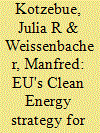| Srl | Item |
| 1 |
ID:
176703


|
|
|
|
|
| Summary/Abstract |
The European Union has more than 2200 inhabited islands. Many keep relying on fossil fuel-based energy systems, even though they are endowed with renewable energy resources (RES) and have access to gradually improving renewable energy technologies. In May 2017 the EU Commission and 14 member states with island territories signed the so-called “Valletta Declaration” in Malta's capital. The declaration states that islands can be favorable for innovative solutions and investments in local renewable energy production, given the abundance of various RES. However, the island nation of Malta features very low renewable energy shares within the EU. The Energy transition theory in the field of sustainable transition studies explains social and technological system-wide evolution and innovation, but only few scholars have focused on spatial governance in islands’ energy transition. Malta's urbanization rate is about 95%, which creates a spatially extreme situation. The policy perspective clarifies the role of spatial governance in Malta's energy transition from a fossil fuel-based to a non-fossil fuel-based country. A theoretical spatial governance framework guides the analysis. The perspective highlights that Malta's centralized and hierarchical spatial governance structure creates an environment, in which the spatial situation is used to argue against small and de-centralized renewable technologies.
|
|
|
|
|
|
|
|
|
|
|
|
|
|
|
|
| 2 |
ID:
098650


|
|
|
|
|
| Publication |
2010.
|
| Summary/Abstract |
One of the priorities of energy policies of the European Union (EU) is to generate 20% of EU's total energy consumption from renewable energy (RE) sources by 2020. The EU policy framework mainly emphasizes economical and technical aspects of RE sources, and promotes large scale projects. However the local implementation of RE EU policies can lead to spatial misfits if the policy implementation neglects the peculiarities of the place. It is important to understand the misfits and relationship between the EU RE policies and the local implementation process, as misfits can affect the policy implementation process and subsequently policy outcomes can be different from those intended, leading to inapt or inapplicable measures. This article presents findings of a qualitative in-depth study of Malta's RE policy implementation. The paper shows that planning of central large-scale RE projects in Malta provokes land and marine use conflicts and can cause difficulties in implementation. The concerned key actors implement the policies according to their motivation, perception, and capacity, and the context in which they are embedded. Hence, both the EU RE policy framework and the national interaction process influence the implementation process, which can lead to spatial mismatches.
|
|
|
|
|
|
|
|
|
|
|
|
|
|
|
|